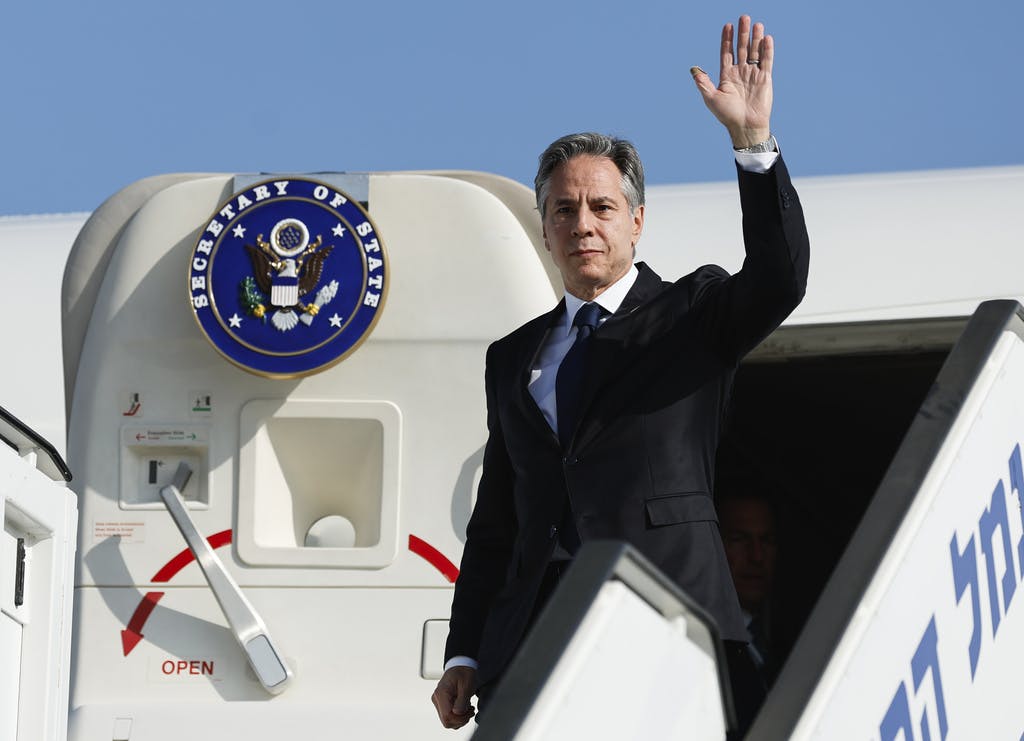As Biden Dispatches Blinken to Mideast for Fifth Trip Since October 7, Could Saudis Be Ready for Israel Peace?
Kingdom puts its priority on a defense pact with America and softens its demands for a Palestinian state. What would the Senate do?

When Secretary Blinken visits Riyadh next week he may find that President Biden’s Mideast plans need refocusing. Until now, Washington has insisted that Saudi-Israeli peace depends on pressuring Jerusalem to accept a Palestinian state. The Kingdom, instead, seems to care mostly about its demands of America.
Mr. Blinken plans to take off Sunday on his way to a fifth Mideast tour since October. Stops are set for Saudi Arabia, Egypt, Qatar, Israel, and the West Bank, the Department of State announced Friday. For a week now, Washington has promoted a plan that would start with a strong response to Iran’s aggression, followed by a recognition of a Palestinian state and, eventually, a push for a Saudi-Israeli peace.
Instead, Reuters is reporting Friday that Riyadh would be willing to “accept a political commitment from Israel to create a Palestinian state, rather than anything more binding.” The main Saudi goal is to “get a defense pact with Washington approved before the U.S. presidential election.”
A strong defense pact akin to Washington’s treaties with NATO and some Asian countries would certainly promote American interests. Crown Prince Mohamed bin Salman is seeking regional stability that would allow his kingdom to develop economic resources beyond oil. For that, he has ended the Yemen war and somewhat thawed relations with regional rivals, including Iran and Qatar. He also tightened relations with Communist China.
A defense treaty could wean the Arab world’s most important country, which is also a major oil producer, away from America’s top global rival. Yet, in an election year, getting such a pact to pass the Senate could prove tricky. According to Reuters, it must be done quickly — no later than June.
Republicans, though, are likely to hesitate about giving Mr. Biden a major diplomatic victory while the presidential election campaign heats up. Democrats, on the other hand, have long eyed the Saudis suspiciously, based on the country’s human rights record. Early in his presidency, Mr. Biden vowed to turn the crown prince, known as MbS, into a “pariah,” and threatened to cut off arms deliveries.
According to the New York Times’s Thomas Friedman, who is an ally of the president, the “Biden doctrine” would simultaneously call Iran’s and Prime Minister Netanyahu’s “bluff.” By pushing the Israeli prime minister to recognize a Palestinian state while dangling peace with Riyadh, Mr. Friedman reckons, Washington could reshape Israeli politics — including by replacing Mr. Netanyahu with someone more amenable to a Palestinian state.
It would be a mistake to jump to such a conclusion. Israelis have long been skeptical of the notion that Palestinian interests are at the top of Riyadh’s agenda. As an Israeli army veteran, General Amir Avivi, told the Sun, the Saudis “care about the two dangers that they face, Iran and the Muslim Brotherhood, and they want to see Hamas destroyed.”
If Mr. Biden does seek to facilitate a Saudi-Israeli peace treaty, he would likely need to put more effort into promoting a defense treaty than in pushing a Palestinian state. His challenge seems to be how to promote peace by directing Washington politics more than to meddle in Israel’s.

